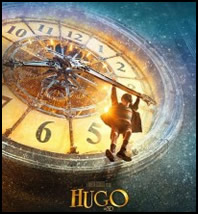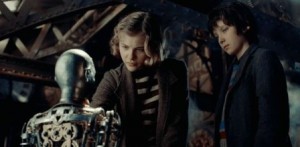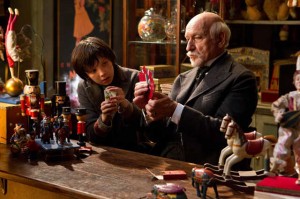Hugo Movie Review
December 11, 2011
By Nick Galasso
 Hugo is director Martin Scorsese’s first foray into the genre of family films. As even the average filmgoer knows, this is the same man who’s known for his portrayals of organized crime, vigilantes, and other assorted criminals in films now held as classics such as Taxi Driver, Goodfellas, and his most recent Best Picture winner, The Departed. Now surely that means this film is a sure-fire failure, right? I mean, the guy should just stick to what he knows best, right?
Hugo is director Martin Scorsese’s first foray into the genre of family films. As even the average filmgoer knows, this is the same man who’s known for his portrayals of organized crime, vigilantes, and other assorted criminals in films now held as classics such as Taxi Driver, Goodfellas, and his most recent Best Picture winner, The Departed. Now surely that means this film is a sure-fire failure, right? I mean, the guy should just stick to what he knows best, right?
Well, no, actually.
With Hugo, Scorsese gives us a film that may very well be one of his best works. We are presented with not only a family film, but a film that anyone with even the slightest love for film would truly appreciate. He handles his foray into a new genre with such care that, if it weren’t for his name on the credits, I doubt you would believe it that this is the same man who’s brought us films with brutal murder sequences and language that contains more “fucks” than nouns.
The film follows the titular protagonist, Hugo Cabret (played by Asa Butterfield), a young boy who resides in a Paris train station after his father (Jude Law) dies and uncle disappears. In between episodes of being chased around by the station’s inspector (Sacha Baron Cohen) for stealing, he attempts to fix an automaton – a mechanical man that is supposed to write with a pen – his father’s last project before he died. However, he gets the blueprints for the automaton taken away by a toy shop owner (Ben Kingsley) from whom he has stolen, causing him to turn to the owner’s granddaughter Isabella (Chloe Moretz) to help him complete the project.
If this plot sounds a little generic to you, that’s because, yeah, it kind of is. If I have one complaint with this movie, it would be that the first half of the film does have sort of a familiar feel to it, with Hugo being the typical orphan boy who once had a loving family but is now chased around like a criminal, and all that nonsense. However, while familiar, this part of the film is not treated like a gigantic walking cliché, as it still allows room for much emotional depth. The film spends a good amount of time giving its attention to each of the main characters, as well as a good deal of minor characters, giving us plenty of insights into who they are and what they are about.

Another aspect of this film’s first act that allows us to be kept thoroughly engaged is the terrific performances by the lead cast, especially Butterfield and Moretz. Never once do we feel emotionally detached from Hugo or Isabella. They never try to manipulate us or try to guilt us into feeling sorry for them with any melodramatic, whiny cries for help accompanied by the appropriate music. They are both the real deal, and rise above all sorts of emotional fabrication. They do want us to feel sorry for them; although they never rub what they want in our faces and have a strong enough will that they show they know how to make do without our sympathies.
However, it is in the second act of the film that the real star performance rises from the shadows, and it is that of Ben Kingsley. During the film, Kingsley’s character is revealed to be that of real-life filmmaker Georges Melies. Now, for those who don’t know their film history, Melies was a French magician-turned-filmmaker who was innovative during the very first days of film, providing us with the first science fiction and fantasy films, as well as providing us with an early usage of special effects within a film. He made hundreds of films during his lifetime before being forced into bankruptcy, causing him to sell most of his films (which were later destroyed) and living out the remainder of his days running a toy shop.
All of these events are covered in the film, told to us in a large flashback sequence that feels as if it’s paying tribute to a fallen hero. During this sequence, we get to see the magic of some of cinema’s earliest days get retold. It is treated with such fondness and passion that it feels like this is the cast and crew of this film themselves speaking through the characters to tell us how much they appreciate the field of work that they are in today and why they feel the film industry is such a great environment to work in.

Kingsley delivers a great performance as the pioneer filmmaker. This comes after a string of disappointing and average films, the only real standout was 2008’s Transsiberian, a film which, while great, is nothing that relies too heavily on performances .Yet, here, Kingsley seems to be putting his heart and soul into this performance, painting such a vivid picture of one of cinema’s earliest filmmakers and the tragedy that befell one of the men who has paved the way for him and the thousands of those involved in the film industry to have the careers they have.
It is this tragic story that helps make Hugo the beautiful film that it is. It may be marketed as a kids’ film, but in actuality, it is really a film-lovers’ film. Beyond its simple, yet effective means of storytelling and its fantastic performances that allow for a general appeal lays the passionate tribute to one of today’s most common forms of art. The film industry is almost taken for granted by the casual movie-goer, but Hugo shows us what those who love film see in the industry, and the true beauty that goes into the process of filmmaking. And that is what makes Hugo the great film that it is.
5 out of 5
~

Hello there sir. This movie didn't have the same effect on me as it did you. You wrote, "The film spends a good amount of time giving its attention to each of the main characters, as well as a good deal of minor characters, giving us plenty of insights into who they are and what they are about." This is one of my biggest flaws with it. I thought it spent too much time developing each character that it took away from the film. It just couldn't maintain my attention because of it. I felt like they could have easily established each character and that would have resulted in a better paced movie. However, I am partially not surprised at this because most of Martin's films this past decade have felt relatively slow paced for me; the exception being The Departed. The performances were top notch by each actor and visually it matched the world Martin created. Overall it was still a good movie; but that's it. It wasn't perfect, it didn't exemplify what movies are about; just a good movie.
3 out of 5